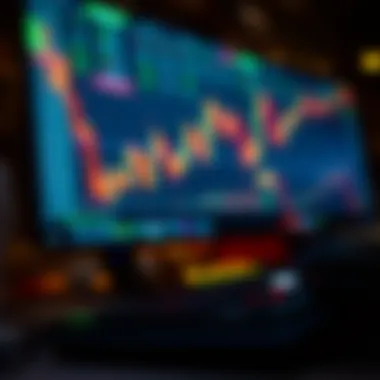Exploring Forex Trading with Robinhood: Insights & Tips


Intro
In recent years, Forex trading has gained tremendous traction among retail investors, driven by the allure of speculation and profit. With platforms like Robinhood making waves in the investment community, the prospect of trading currencies is more accessible than ever. This article investigates how Robinhood facilitates Forex trading, comparing its features to traditional platforms while exploring the associated advantages and challenges. For those curious about the fast-paced world of currency trading, understanding the functionalities of Robinhood might just be the key to unlocking potential profits.
Overview of the Financial Product
Forex trading, shorthand for foreign exchange trading, involves buying and selling currencies with the aim of making a profit from fluctuations in their value. Robinhood, primarily known for its stock and options trading, now also caters to this market, enabling its users to navigate the vast world of currency exchange with ease.
Description of the product
Robinhood offers a straightforward interface for trading Forex, focusing on simplicity and user experience. Unlike traditional Forex brokers that may require complex setups and large initial investments, Robinhood allows traders to jump in with little more than an app on their smartphones. This democratization of trading means that virtually anyone can start engaging with Forex without a hefty commitment.
Key features and benefits
Among the notable features of Robinhood's Forex trading platform include:
- Commission-free trading: A major advantage for users looking to maximize their profits. Traditional brokers often charge substantial fees that can dent your earnings, but Robinhood takes a different approach.
- User-friendly interface: Designed with the user in mind, the app simplifies complex trading concepts, making it easier for novices to grasp Forex trading.
- Real-time market data: Access to up-to-the-minute information is crucial in Forex trading. Robinhood provides comprehensive market data, allowing investors to make informed decisions.
- Portfolio tracking tools: Users can easily monitor their positions, analyze performance, and adjust strategies accordingly.
As Forex trading unfolds on this platform, one must remain mindful of various factors influencing currency values, from economic indicators to geopolitical events.
"Understanding the intricacies of Forex trading requires not only knowledge but also a willingness to adapt and learn from the market's ever-changing dynamics."
Investment Strategies and Tips
Before diving headfirst into the Forex market through Robinhood, it's essential to consider proper investment strategies that align with your financial goals.
Recommended investment approaches
Several strategies can prove beneficial:
- Trend trading: This involves analyzing currency pairs to identify consistent price movements and capitalizing on them. Patience is key here.
- Scalping: For those who revel in fast-paced trading, scalping allows for quick trades throughout the day to profit from small price changes. Just be prepared for a lot of quick decisions.
- Currency pairs diversification: Don’t put all your eggs in one basket; diversify by investing in multiple currency pairs. This can balance out risks and rewards across different trades.
Risk assessment and management strategies
Forex trading is not without its perils. Understanding and managing risks is crucial:
- Set stop-loss orders: This protects your investments by automatically closing trades at predefined loss points.
- Start with a demo account: Get a feel for the interface and market dynamics without risking real money. This practice can build confidence before moving to live trading.
- Stay informed about economic news: Many factors can influence currency prices, from interest rates to employment data. Keeping an eye on these can give you an edge in your trading decisions.
In summary, using Robinhood for Forex trading can open new avenues for investors willing to engage thoughtfully with the market. Balancing the innovative features of the platform with strategic trading approaches will maximize the chances of success.
Prelims to Forex Trading
Trading in the foreign exchange market, or forex trading, has exploded in popularity over the years. It serves as a prominent arena not just for large financial institutions, but also for individual investors slightly dipping their toes into the water of international markets. The fast-paced environment of forex is both exciting and risky, making it crucial for one to understand the nuances of this financial domain.
Definition of Forex Trading
Forex trading refers to the act of exchanging one currency for another in hopes of making a profit based on fluctuations in currency values. The forex market, operating 24 hours a day, five days a week, encompasses trading pairs like EUR/USD, GBP/JPY, and USD/CAD, capturing the dynamic interactions between different countries' economies.
In simpler terms, when one buys forex, it’s akin to making a wager on which way a currency's value will move—up or down. For instance, if you think the euro will strengthen against the dollar, you’ll buy Euros with Dollars. Should the euro strengthen, you’d then exchange Euros back into Dollars at a profit. This fast-moving market allows traders to utilize leverage, which can amplify both gains and losses, thus increasing the risk.
Importance of Forex Market
The forex market is far from being just another financial trading venue. Rather, it stands as the backbone of international finance and trade by facilitating the conversion of currencies essential for global business operations. Here are a few reasons why the forex market is vital:
- Liquidity: With an average daily trading volume of over $6 trillion, the forex market is incredibly liquid. This means traders can enter and exit positions with ease, without significantly affecting the market price.
- Accessibility: Nowadays, anyone with an internet connection can trade forex from the comfort of home. Platforms like Robinhood open doors for everyday investors, allowing them to engage without needing hefty capital.
- Economic Indicator: Currency values often serve as indicators of economic strength. Traders analyze international financial health by tracking forex trends, making it a rich resource for economic forecasts.
- Diverse Opportunities: With the ability to trade multiple currency pairs, traders have room to diversify their portfolios. This flexibility can lead to new avenues for profit.
The forex market isn’t just about profit; it's a reflection of the world economy, demonstrating how interconnected and interdependent global finances are.
In summary, understanding forex trading is not merely a smart financial move but a gateway to comprehending broader economic trends, with implications that can impact individual investors from various walks of life, especially in platforms like Robinhood. Knowledge of forex can indeed act as the ace up the sleeve for savvy investors aiming to navigate the complex world of finance.
Understanding Robinhood
The emergence of Robinhood has significantly shaped the way individuals engage with financial markets. As a platform, it democratizes access to various trading instruments, fostering an environment where individuals, from novices to experienced investors, can participate in forex trading without the traditional barriers of entry. By blending ease of use with a range of capabilities, Robinhood stands out in the crowded field of online trading platforms. In this section, we will explore the essential aspects of Robinhood that are particularly relevant for forex trading.


Overview of Robinhood
Robinhood took the financial world by storm when it launched, primarily distinguished by its commission-free trading model. Established in 2013, the platform has since become synonymous with the rise of retail trading. Users can trade stocks, options, ETFs, and, more recently, cryptocurrencies and forex all without paying hefty fees, a game-changer for many investors who were previously deterred by traditional brokerage costs.
One of the highlights of Robinhood is its sleek, intuitive interface. Designed with user experience in mind, the app simplifies complex trading processes. This characteristic makes it particularly attractive to beginners who might find the technicalities of forex trading daunting. Users can quickly learn the ropes of currency pairs and market dynamics all while managing their trades at their fingertips.
Key Features of Robinhood Platform
When dissecting Robinhood’s offerings, several key features stand out, particularly for those interested in forex trading:
- Commission-Free Trading: At the heart of Robinhood's appeal is its zero-commission trading model, enabling users to trade currency pairs without incurring transaction fees. This allows for more frequent trading without worrying about diminishing returns.
- Simple Account Setup: Opening an account on Robinhood is straightforward. The platform facilitates a quick setup process, enabling users to get started with minimal hassle. Users need just a basic identification and a few personal details to create their accounts.
- Instant Deposits: Unlike some platforms that require waiting periods for fund transfers, Robinhood offers instant deposits. This means traders can execute their forex trades immediately once they have funds available, a crucial factor in the fast-paced forex landscape.
- User-Friendly Mobile Experience: The mobile-focused design of Robinhood caters well to on-the-go traders. Notifications of market movements, access to live quotes, and real-time market data can be obtained through the app, enhancing trading efficiency.
- Educational Resources: Robinhood invests in providing users with knowledge to navigate financial markets. Aside from trading functionalities, leveraging educational resources on forex can assist traders in developing strategies that align with their financial goals.
In summary, Robinhood positions itself as a modern platform that aligns with the needs of the contemporary trader. Understanding these elements is crucial for anyone considering forex trading on Robinhood, as they significantly impact trading decisions and overall experience.
"The real art of trading is having a strategy that works for you, and Robinhood's tools invite users to engage thoughtfully into their trading journey."
For further insight into the Robinhood platform, consider visiting resources such as Robinhood’s official website or explore community discussions on Reddit to grasp practical tips from fellow traders.
Can You Trade Forex with Robinhood?
The topic of trading forex on Robinhood is increasingly important for both new and seasoned investors looking to expand their trading portfolio. Typically associated with stocks and ETFs, Robinhood’s approach to forex paves the way for a unique yet simplified trading experience. This section dives into the availability of forex trading through Robinhood and how it stands apart from more traditional aspects of forex trading.
Availability of Forex Trading
Robinhood introduced the ability to trade forex quite recently, a shift that has caught the eye of many traders who are used to a more traditional platform. But can you really trade forex on Robinhood? A resounding yes, but with some caveats. Trading forex on Robinhood offers accessibility to a limited number of currency pairs, primarily focused on major currencies such as the U.S. dollar, euro, and Japanese yen.
However, the selection is not as expansive as platforms dedicated purely to forex trading. For those just starting out, this narrowed focus on major pairs can actually be beneficial as it simplifies decision-making. You don't have to sift through a myriad of options to find a pair that suits your strategy. Moreover, as the app is user-friendly, it allows traders to jump right in without getting bogged down in complicated interfaces.
"Having a straightforward platform like Robinhood can demystify forex trading for many."
Additionally, trading on Robinhood is possible without incurring commission fees, which means that you can experiment with trades without the nagging worry of making a costly mistake. This could lead to a better learning experience, especially for beginners who might still be sketchy on their trading acumen.
Differences from Traditional Forex Trading
When comparing Robinhood to traditional forex trading platforms, the differences can be striking. For one, traditional forex platforms like MetaTrader or OANDA typically offer a much wider array of currency pairs, including emerging and exotic currencies. This means more options for diversification but also more volatility. Although Robinhood helps to streamline the trading process, it can mislead some traders into thinking they are getting a complete forex experience.
Furthermore, traditional platforms usually come equipped with a rich array of analysis tools and features for advanced trading strategies. Tools like charting capabilities, order types, and automated trading are somewhat lacking on Robinhood. This means that seasoned traders may find the platform limiting when attempting to implement multi-layered strategies.
In sum, while trading forex through Robinhood is feasible and accessible, it comes with its own set of limitations and lacks the breadth found in more established forex trading systems. Knowing these differences may help investors make informed decisions about whether or not to use Robinhood for their forex trading needs.
Advantages of Trading Forex on Robinhood
When exploring the potential of trading forex, particularly on the Robinhood platform, various advantages arise that could enhance your trading experience. Understanding these benefits provides insight into why many traders, both novice and experienced, are gravitating towards this platform.
Cost-Effective Trading
One of the most significant advantages of trading forex on Robinhood is the cost-effectiveness it offers. Unlike many traditional trading platforms that often charge hefty commissions and fees, Robinhood operates on a commission-free model. This means that you can engage in trading currencies without worrying about excessive costs eating into your profits.
This model is particularly beneficial for individual investors who may not have large capital to start with; every penny counts. By eliminating those additional costs, traders can more freely explore different strategies without the constant fear of accruing fees that might lead to a net loss. Emerging traders often think that cost must correlate with quality, but that is not the case here.
However, it’s essential to consider the indirect costs associated with trading. Although commission fees are absent, the market spread—the difference between the buying and selling prices—can still impact profitability. Keeping an eye on these spreads is crucial. Hence, traders should remain mindful of the market conditions and how they can affect overall trading results.
User-Friendly Interface
Another compelling advantage of Robinhood is its highly user-friendly interface. Designed with simplicity in mind, Robinhood attracts a variety of users, especially those who may be inexperienced with online trading. If you’ve ever tried navigating complex trading platforms, you’ll understand the appeal of having everything laid out in an intuitive manner.
The app’s clean design allows even beginners to quickly grasp the necessary tools. For example, opening a trade, checking market data, and monitoring your portfolio is all just a few taps away. Similarly, the ease of switching between different currency pairs encourages users to explore various trading opportunities without feeling overwhelmed by technical intricacies.
Furthermore, Robinhood includes educational resources within the app, giving traders a chance to learn on-the-go. Short guides and explanations help users better understand the forex market, important trading terms, and even how economic events can impact currency prices. Being armed with knowledge is a great way to boost confidence in trading.
Overall, the combination of cost-effectiveness and a user-friendly interface provides a strong argument for why one might consider trading forex through Robinhood. These elements empower traders to engage in the market without getting bogged down in technicalities or excessive costs.
"Cost and ease of use are two critical factors that draw many traders to Robinhood for forex trading."
As the landscape of online trading evolves, understanding the advantages of platforms like Robinhood becomes increasingly important for making informed decisions about forex investments.


Challenges and Limitations of Robinhood for Forex
When it comes to trading in the global currency market, Robinhood has made its mark as an accessible platform. However, indulging in forex trading via Robinhood presents its fair share of challenges and limitations. Let’s explore some specific areas that warrant consideration for both new and experienced traders.
Limited Currency Pairs
One notable limitation of Robinhood's forex trading capabilities is the narrowly defined selection of currency pairs. Unlike other platforms which boast dozens or even hundreds of pairs, Robinhood primarily focuses on a smaller subset. This restriction can be somewhat disheartening for traders who have diverse strategies or are looking to capitalize on specific market opportunities.
Let’s break it down further:
- Familiar Pairs Only: Most commonly, you’ll find major pairs like EUR/USD or USD/JPY. While these are essential for many traders, strategies involving lesser-known currencies can be hard to execute without the proper tools.
- Market Opportunities: The forex market thrives on the opportunity created by fluctuations in currency values across many pairs. Missing out on potential trades due to a limited offering could thwart the strategic plans of seasoned traders.
In summary, while Robinhood simplifies the trading experience, the limitation in currency pairs can become a hindrance for those who seek to engage in more comprehensive strategies aimed at maximizing their trading potential.
Lack of Advanced Trading Tools
In the realm of forex trading, having access to advanced tools can be the difference between a profitable trade and a loss. However, Robinhood does not provide several critical features that a dedicated forex trader might find indispensable. This may raise some eyebrows when one considers the competitive landscape of forex trading platforms that cater to keen-minded investors.
"A good trader is not defined by their ego, but by their tools and strategies."
Here are some essential tools often missing from Robinhood:
- Technical Indicators: Many platforms offer a wide array of technical indicators to help traders make data-driven decisions. Robinhood's offering is rather basic, which could leave those relying on technical analysis feeling shortchanged.
- Charting Features: Advanced charting tools are crucial for detailed analysis, enabling users to track market trends effectively. Without robust charting functionalities, traders may find it harder to visualize price movements, a critical aspect of forex trading.
- Demo Accounts: Many trading platforms offer demo accounts where individuals can practice trading without real money. The absence of this feature on Robinhood impairs the ability of new traders to familiarize themselves with forex trading mechanics.
Comparison with Other Forex Platforms
In the fast-paced world of forex trading, selecting the right platform can make or break your trading experience. Each platform has its unique offerings, strengths, and weaknesses. This section will put Robinhood's forex trading capabilities into perspective, week by week, by contrasting them with established platforms like MetaTrader and OANDA. Understanding these differences is crucial for traders looking to maximize their investments wisely and effectively.
Versus MetaTrader
MetaTrader is often seen as the gold standard for forex trading platforms. It boasts an extensive toolkit that caters to both beginners and expert traders. Here are a few key points of comparison:
- Functionality: MetaTrader provides advanced charting tools and technical indicators. This allows traders to analyze trends meticulously. In contrast, Robinhood's offerings can feel basic, lacking the depth required for intricate strategies.
- Automation: With MetaTrader, traders can automate their strategies through Expert Advisors (EAs). This is a boon for those who wish to combine their experience with algorithms. On the other hand, Robinhood doesn’t support auto-trading functionalities, which might be a significant drawback for traders who cherish hands-off strategies.
- Community Support: MetaTrader has a robust online community. Plenty of forums and resources are available for study and advice. The Robinhood community is still growing but lacks the extensive resources that can be found with MetaTrader users.
While Robinhood's platform has its conveniences, it can be likened to a sturdy bicycle, whereas MetaTrader is essentially a high-performance sports car. Both get you from A to B, but the experience differs vastly.
Versus OANDA
OANDA has gained a reputation for its transparency and reliability. It's another heavyweight in the forex trading realm that's worth comparing. A few points of contrast include:
- Range of Currency Pairs: OANDA provides access to a wider range of currency pairs compared to Robinhood. For traders interested in niche currencies or exotic pairs, OANDA is preferable. Robinhood, while emerging, offers limited options in this regard, which may deter those with broader trading plans.
- Research and Resources: OANDA excels in providing educational resources, market analysis, and real-time insights. This infrastructure is integral for traders making informed decisions. Robinhood has some educational sections, but they pale compared to OANDA’s comprehensive offering.
- Fee Structure: Robinhood is synonymous with commission-free trading, which appeals to cost-sensitive investors. OANDA, however, has a different fee structure that incorporates spreads. Depending on one’s trading volume and style, this might tilt the balance in favor of Robinhood for new traders.
In a nutshell, while Robinhood might attract new traders with its simplicity and cost-effectiveness, it leaves a lot to be desired when compared to the robust capabilities of both MetaTrader and OANDA. Each tool has its role, and understanding them provides traders with a clearer roadmap to achieve their goals. \n
"The best platform is the one that aligns with your trading style and goals."
For further reading on each platform, check out MetaTrader, OANDA, and the rankings on forums like Forex Factory.
Regulatory Considerations
Understanding regulatory considerations in forex trading is crucial for both novice and experienced traders. The forex market is vast and interconnected, requiring a fertile ground for compliance and regulation to protect both traders and the market's integrity. In this section, we will dive into the specifics of compliance and regulations, and explore the impact these legal frameworks have on trading activities, especially for those using Robinhood.
Compliance and Regulations
Regulation in the forex market serves as a bedrock for maintaining fair trading practices. Authorities like the Commodity Futures Trading Commission (CFTC) and the National Futures Association (NFA) in the United States enforce rules aimed at preventing fraud and ensuring that brokers operate transparently.
For traders using Robinhood, understanding these compliance measures is vital. Robinhood, while primarily known for equities trading, is under the purview of these regulatory bodies when offering forex services. Some key areas of focus include:
- Transparency: Regulations enforce that brokers disclose their trading practices, ensuring traders understand fees and potential conflicts of interest.
- Investor Protection: Traders are protected against unethical practices, such as manipulation or unfair margin requirements.
- Market Surveillance: Regulatory bodies monitor activities, helping to watch out for anomalies or illegal trading behaviors that can affect overall market stability.
As such, compliance isn’t just a box to check; it’s a crucial consideration for effective and trustworthy trading. Every trader should familiarize themselves with both the regulatory environment and Robinhood's specific compliance outline to ensure they’re operating within legal bounds.
Impact of Regulations on Trading Activities


Regulations deeply influence how forex trading operates on platforms like Robinhood. The measures enforce rigors that impact trading strategies, risk management practices, and the overall trader experience. Here are some core elements:
- Leverage Limits: Regulations often set caps on the amount of leverage brokers can offer, decreasing the risk of significant losses for inexperienced traders. While this may limit some higher-risk strategies, it also creates a safer trading environment.
- Account Security: Compliance regulations require brokers to maintain adequate safeguards for customer funds, meaning that traders' investments have a level of security against broker failure.
- Withdrawal Processes: Regulations ensure that withdrawal processes are transparent and straightforward, which is particularly important for traders looking to secure their gains quickly.
Overall, regulatory frameworks shape the operational boundaries for forex trading. While some may view these regulations as cumbersome, they ultimately serve to protect investors and ensure a level playing field across the board.
"In the world of forex trading, regulations are like the fine print—often overlooked but crucial for a smooth ride."
The complexities of regulations might seem daunting, but they provide structure and stability. Whether it is monitoring leverage or securing funds, these frameworks are designed to bolster trust within the trading community.
Risk Management Strategies
Risk management is a fundamental aspect of forex trading that can't be overlooked, especially when using a platform like Robinhood. This section will dive into why having a solid strategy in place is crucial and will explore effective techniques that can safeguard your trades and investments.
Importance of Risk Management in Forex
When it comes to forex trading, the stakes can be high; currencies fluctuate based on a plethora of factors including political events, economic data, and market sentiment. Thus, understanding and implementing risk management strategies is vital to preserving capital and achieving long-term success.
- Preservation of Capital: This is perhaps the most obvious benefit. By managing risk, traders can protect their funds from substantial losses that can arise from unpredictable market movements. There’s an old saying in trading: “Cut your losses short and let your profits run.” This implies that limiting losses is paramount to staying in the game.
- Emotional Stability: A well-structured risk management plan can help minimize stress and anxiety associated with trading. When you have a safety net, you can make decisions more rationally rather than letting emotions dictate your actions. Fear and greed are two emotions that can lead to impulsive trading, so mitigating these through risk management is essential.
- Enhanced Decision Making: With a risk management strategy in place, you can make informed choices about when to enter and exit trades. It allows you to focus on your trading strategy rather than worrying about the potential for catastrophic losses.
"A bad day in trading could be a good day for learning, as long as you manage your risks accordingly."
Effective Risk Management Techniques
It's one thing to recognize the importance of risk management, but implementing practical techniques is where many traders find success. Here are some effective techniques to consider:
- Position Sizing: Knowing how much to risk on a single trade is fundamental. Many experts suggest risking only a small percentage of your total account balance, typically between 1%-2%. This approach prevents substantial drawdowns and keeps you in the game longer.
- Setting Stop Loss Orders: This is perhaps the most common tool within risk management. A stop loss order automatically exits a trade when the price reaches a certain level, ensuring that losses don’t spiral out of control. Understanding where to place these critical orders based on technical analysis is key for maximizing their effectiveness.
- Diversification: Just as in other types of investing, diversifying your currency pairs can help manage risk. Avoiding putting all your eggs in one basket protects you from unforeseen events affecting a specific currency pair.
- Routine Evaluations: Periodically reviewing your trades and strategies can illuminate patterns or mistakes. This evaluation process helps you understand what works and what doesn’t, allowing you to refine your approach continuously.
- Use of Risk-Reward Ratios: Calculating the potential reward of a trade relative to its risk can help you make informed decisions. A common guideline is to aim for a minimum reward-to-risk ratio of 2:1, meaning that for every dollar you risk, you expect to gain two.
- Accountability: Keeping a trading journal is another effective way to manage risk. It provides insight into your trading decisions and emotions, making it easier to spot bad habits that might be leading you away from your risk management strategy.
By understanding and incorporating these techniques, traders can reduce the impact of adverse movements in the forex market, navigating the ups and downs of trading with more confidence and security. In the unpredictable world of forex, effective risk management isn't just smart; it's essential.
Techniques for Successful Trading
Understanding the techniques for successful trading is critical for anyone looking to navigate the complexities of the forex market, especially on a platform like Robinhood. With volatility at every corner, traders must arm themselves with strategies that can maximize potential gains while mitigating risks. Each trader’s journey becomes uniquely theirs, driven by their own understanding and adaptability.
The essence of successful trading doesn't merely rest on having a solid grasp of the numbers or understanding platforms. Instead, it intertwines an ability to analyze data, connect economic dots, and predict market movements effectively. This is particularly vital for forex trading, where currencies can fluctuate wildly based on a multitude of factors. Let's delve deeper into the essential components that separate the novices from the pros.
Technical Analysis Basics
At its core, technical analysis revolves around examining historical price movements to forecast future currency behaviors. Through charts and historical data, traders seek patterns that can indicate where the market might be headed.
One of the most beneficial aspects of technical analysis is its ability to simplify the decision-making process. Traders can focus on visual aids rather than overwhelming themselves with endless fundamental data. Common tools used include:
- Candlestick Charts: These illustrate price movements and trends over specific timeframes, lending insight into market sentiment.
- Moving Averages: By tracking average prices over time, traders can identify potential trends, smoothing out short-term fluctuations to highlight longer-term movements.
- Relative Strength Index (RSI): This momentum oscillator measures the speed and change of price movements, helping traders identify potential reversal points.
However, it’s important to remember that technical analysis is not foolproof. Prices can be influenced by unexpected news or events, so alongside this analysis, a trader must also be finely attuned to current events.
Utilizing Fundamental Analysis
While technical analysis tends to focus on price actions, fundamental analysis digs deeper into the underlying factors that drive currency values. This method examines a country’s economic indicators, policy changes, and news events that can sway the market.
Factors to consider include:
- Interest Rates: Changes in a country's interest rates can greatly impact its currency value. Generally, an increase in rates can lead to higher currency values as they offer better returns to investors.
- Economic Data Releases: Metrics like GDP reports, employment figures, and inflation rates can significantly affect currency sentiment.
- Political Stability: A country with a stable political climate is more appealing for investment, often propelling its currency upward.
In practice, effective traders blend both technical and fundamental analyses. Ignoring either could lead to missed opportunities or unexpected setbacks.
Closure
In this article, we explored the multifaceted world of forex trading through the lens of Robinhood. A crucial takeaway is that while Robinhood offers a straightforward platform for trading currencies, it is vital to balance its benefits against the limitations it presents. Financial enthusiasts and individual investors should recognize that clarity in their trading decisions can significantly affect their outcomes.
Recapping the Key Insights
- Access to Forex Trading: Robinhood has made forex trading more accessible by eliminating commissions and simplifying the trading process, attracting both novice and seasoned traders.
- User Experience: The user-friendly interface is beneficial for beginners, allowing easy navigation and understanding of market dynamics without getting overwhelmed.
- Limitations: Though the platform is appealing, its limitation in available currency pairs and lack of advanced trading tools could restrict more experienced traders looking for sophisticated analyses and trading strategies.
- Regulatory Insight: Navigating the regulatory landscape is essential in forex trading, and Robinhood's compliance with regulations ensures that traders can operate within a secure framework.
Final Thoughts on Using Robinhood for Forex Trading
Ultimately, choosing to trade forex on Robinhood hinges on your individual trading style and goals. If you’re a beginner eager to dip your toes into the forex waters, the platform can be a helpful starting point. However, seasoned traders or those looking for a broader range of tools may find themselves limited.
It's fundamentally crucial to grasp the risks associated with forex trading, no matter which platform you choose. Taking the time to thoroughly understand these factors will empower your trading decisions and help build a robust trading strategy.
In summary, evaluate your trading aspirations, understand the nuances of Robinhood’s platform, and make informed choices that align with your financial goals. The world of forex trading can be rewarding when approached with the right mindset and strategy.



